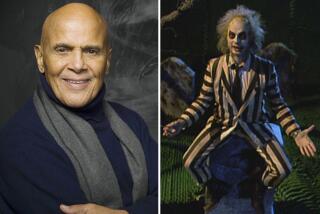COULD IT BE MAGIC? : The Lawns Are Alive With the Sound of Manilow
- Share via
With young children across the country playing Barry Manilow’s “Thumbelina” songs over and over and over, as kids are wont to do with favorite music, it’s easy to imagine their otherwise sweet and charming mothers being driven into homicidal rages.
Sounds like an idea for a John Waters movie, eh?
Indeed, it’s Manilow’s sunny “Daybreak” that is sort of the theme song for fussy housewife Kathleen Turner’s psychopathic rampage in Waters’ new “Serial Mom.” And if that’s not enough Manilow for you, Mike Newell’s sloshed English wedding-goers are driven to distraction by a “Frightful Folk Duo” performing an incessantly bubbly version of the schlock-pop god’s “Can’t Smile Without You” at the first nuptial of his “Four Weddings and a Funeral.”
Yes, folks, it’s Manilow season at the movies.
Open season.
What’s Manilow think about all this? He’s not talking. His spokeswoman says he’s too busy rehearsing those “Thumbelina” numbers for his upcoming concert tour. (Maybe they should check purses for sharp objects at each show.)
But by all accounts Manilow must have a good perspective about his reputation as the embodiment of all that is white bread and wholesome in pop music. In fact, for years he’s been laughing all the way to the bank.
“I wish every person who ever hummed (“Daybreak”) would come to my movie,” says Waters, dreaming wistfully of the kind of cushy retirement in his Baltimore home that such massive popularity would bring.
Waters insists that he’s laughing with Manilow--who’s close pals with Suzanne Somers, who has a funny role as herself in the flick--and not at him.
“I heard he has a great sense of humor--he started out working with Bette Midler and I’m sure I’d love him,” says Waters, who has never met Manilow. “I just wanted the music to be extreme--but a different kind of extreme music--and to me that song is extreme suburbia. I like the song.”
He also says he delighted in pairing the song on the soundtrack album with “Gas Chamber,” performed by the rowdy female rock group L7, cast in the film as the fictional group Camel Lips.
Getting permission to use Manilow’s song actually proved easy, Waters says. It was much harder to get clearance to use the song “Tomorrow” from “Annie,” and the name of the Franklin Mint, two other symbols of Middle American values.
“For ‘Annie’ it was more difficult,” he says of “Tomorrow,” which figures in a particularly humorous murder. “Especially when we sent them the script pages. They’d asked, ‘How’s it used?’ ‘Well, someone’s singing it and, um, something happens.’ We try to be vague. It never works.”
In Manilow’s case, his spokeswoman, Susan Dobow, says that the singer “said it was OK as long as (its use) wasn’t mean-spirited.” She noted that Manilow also approved a long-running gag about him on “Murphy Brown,” in which the Manilow-hating Murphy was dismayed to discover that his music was the only thing that would calm her infant. Manilow even made a guest appearance last year.
Waters admits that he was not really a Manilow fan before deciding to use one of his songs in the film and had to do a little research to find just the right tune.
“You should have seen the guy’s face in the record store where I always shop when I had like five Manilow albums at once,” Waters says.
Now he is something of a fan, and among his treasures is an autographed 45 of the original recording that Turner gave him after the film was completed.
And what of the parents being run ‘round the bend by the “Thumbelina” soundtrack?
“Maybe they can put on ‘Daybreak,’ ” says Waters, “and relieve their tensions.”
More to Read
Only good movies
Get the Indie Focus newsletter, Mark Olsen's weekly guide to the world of cinema.
You may occasionally receive promotional content from the Los Angeles Times.










